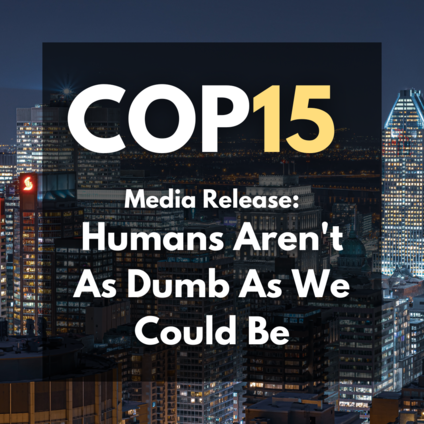
Tio'tia:ke, Montréal, Canada - Sierra Club Canada Foundation welcomes a new global framework to protect all life on Earth, but the work is only beginning to achieve harmony with nature. Canada’s Minister of Environment and Climate Change committed during the negotiations to establish legislated targets to protect biodiversity - an important opportunity to stop threats and create a positive relationship with nature.
"We could have come out of this meeting with no deal at all, and instead we have seen a renewed commitments, including recognition of Indigenous rights and the rights of local communities, and the creation of a new fund to protect nature globally," according to Gretchen Fitzgerald, National Programs Director with the Sierra Club Canada Foundation.
Sierra Club Canada had ambitious policy requests for the framework:
Recognition of the Rights of Mother Earth;
A strong new global biodiversity framework that includes protecting 30% of lands and waters, and is supported with adequate resources to achieve commitments;
A halt to all new fossil fuel projects, such as the Bay du Nord oil drilling project
Significant global funding to achieve targets;
A Pan-Canadian approach to protecting biodiversity that included engagement from municipal, provincial, territorial, indigenous, and federal governments; and
A commitment to stop the extinction of species such as the critically endangered North Atlantic right whale.
"The new agreement does not go far enough to halt unjust loss of nature, but it recognizes the Rights of Mother Earth as one of the ‘value systems’ that can be part of successful implementation," according to Ole Hendrickson, President of Sierra Club Canada Foundation. "It also contains a target of [‘e]nhancing the role of collective actions, including by Indigenous peoples and local communities, in Mother Earth centric actions’, something Sierra Club Canada members and supporters are keen to take up in the years and months ahead. It was also heartening to see a target to ensure full, equitable, and inclusive decision-making and access to justice for Indigenous people and local communities - if truly implemented here in Canada, this would address many of the harms to nature and communities we fight every day."
Conor Curtis, Head of Communications at Sierra Club Canada Foundation says that "During the negotiations we repeatedly called on Canada and companies such as Equinor to acknowledge the threat of burning more fossil fuels and the risks posed by projects like Bay du Nord to biodiversity. And while the Framework acknowledges climate change as one of five ‘direct drivers’ of biodiversity loss, and contains a commitment to ‘minimize’ the impact of climate change on biodiversity, it completely fails to recognize the threat of fossil fuel expansion to its targets. This is a huge miss and shows we are far from the transformative change the agreement aims to achieve."
The framework has also fallen short on funding its work. It contains a commitment to fund implementation to the tune of at least $200 Billion every year by 2030, and to have funding from developed countries of $20 billion by 2025 and 30 billion by 2030. This is far lower than the $700 Billion funding needed per year by 2030, and stop gap funding needed until then of $100 billion per year, that the African Union (a coalition of 55 CBD member states) with the support of many developing countries and China have proposed since 2030. (1)
"Important to our work in conserving natural spaces in Montreal and Edmonton, and of note considering efforts underway to degrade the Southern Ontario greenbelt, the framework commits to ‘significantly increase’ the area, quality, connectivity of, access to, and benefits from green and blue spaces in urban and densely populated areas. It also states all levels of government or a ‘whole of government’ approach will be needed in order to be successful," according to Fitzgerald. "In addition to the 30% protection of land and waters target, it also committed parties to ensuring at least 30% of degraded lands and waters are under ‘effective restoration’ by 2030 - of key importance to threatened places like the Gulf of St. Lawrence and Prairie pothole regions. The framework also states that countries will act to stop extinctions: We will be looking for Canada to step up its actions to stop the imminent extinction of species on the edge such as the critically endangered North Atlantic right whale.”
"The agreement acknowledges the ‘human right to a clean and healthy and sustainable environment’ central to our work on air pollution via the Breath Easy project. But it fails to confront this threat of pollution in a meaningful way when it comes to burning of fossil fuels - a major cause of air pollution - or by stopping the use of harmful pesticides." according to Hendrickson. "The agreement only calls for a 50% reduction in pesticides and highly hazardous chemicals, and only for ‘working toward’ stopping plastic pollution. Clearly, we have our work cut out for us to pressure governments everywhere to effectively deal with these threats to biodiversity and human health."
"One quarter of species on Earth are threatened and 1 million species face extinction. The agreement commits to being ‘action oriented’ and to drive a transformative change in our relationship with the living world. We will be holding our leaders accountable, and seeking commitments to act swiftly and boldly to stop threats to biodiversity, and most importantly to place nature at the center of decision-making. Our leaders must begin to respect the rights of Mother Earth, stop the extinction of whales and other endangered species, protect and restore critical places, stop approving new fossil fuel projects, and work to ensure Canadians have access to connect with nature," states Fizgerald.
-30-
For more interview contact information please email: Media@sierraclub.ca
Footnotes:
(1) https://www.greenpeace.org/international/press-release/57313/cop15-clima...
